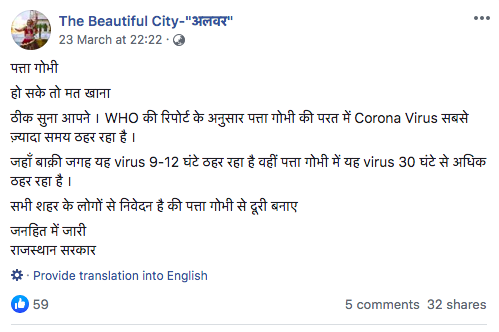
WHO did not warn against eating cabbage during the COVID-19 pandemic
- This article is more than five years old.
- Published on April 2, 2020 at 05:45
- 2 min read
- By AFP India
The claim was published on Facebook here on March 23, 2020.
Below is a screenshot of the misleading post:

The post’s Hindi-text translates to English as: “Don’t eat cabbage, according to a WHO report, the coronavirus stays in cabbage for a very long time. On usual objects, the strains last for at least 9-12 hours, whereas the strain of the virus lasts more than 30 hours on cabbage. People are advised to stay away from cabbage.”
The novel coronavirus, which causes the disease COVID-19, was first detected in the Chinese city of Wuhan in late 2019. As of April 1, 2020, COVID-19 has killed at least 40,598 people globally, and infected 823,626 others, according to this WHO report.
A similar claim about the WHO advising against eating cabbage were also shared on Facebook here and here and on Twitter here and here.
The claim is false. A WHO India representative told AFP by phone on March 30, 2020, that the agency did not issue the purported advisory. The official WHO website also does not include any warning regarding the consumption of cabbage.
The Indian central government’s official Press Information Bureau refuted a similar false claim on Twitter here on March 24, 2020.
The tweet translates to English as: “No such report has been released by the World Health Organization.”
नहीं | विश्व स्वास्थ्य संगठन द्वारा ऐसी कोई भी रिपोर्ट जारी नहीं की गई हैं | #Coronavirus पर भ्रामक जानकारी से भ्रमित न हों |
— PIB Fact Check (@PIBFactCheck) March 24, 2020
खुद को और अपने परिजनों को कोरोना वायरस से सुरक्षित रखने के लिए आपस में उचित दूरी बनाए रखें।
हम सब साथ मिलकर #COVID19 से लड़ सकते हैं | pic.twitter.com/4r1BGkXRyx
The US-based Centre of Disease Control and Prevention (CDC) says there is "no evidence to support transmission of COVID-19 associated with food".
"Before preparing or eating food, it is important to always wash your hands with soap and water for 20 seconds for general food safety", it says. "Throughout the day, wash your hands after blowing your nose, coughing or sneezing, or going to the bathroom."

Copyright © AFP 2017-2026. Any commercial use of this content requires a subscription. Click here to find out more.
Is there content that you would like AFP to fact-check? Get in touch.
Contact us
